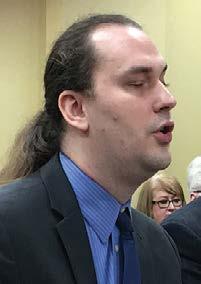
2 minute read
Policy Service updated; more to come
ASBA Policies Director Lucas
Harder completed the updates to the Model Policy Service May 1 in order to give districts time to update their own policies, even though much of the LEARNS Act’s provisions must be fleshed out through the rules and regulation process.
In other words, the policies will have to be updated again.
“There will likely be, depending on how close I estimated on where the department would go when the rules are crafted, I’m sure there will be anywhere from minor tweaks to some policies to major revisions to make sure that districts are fully in alignment once the rules come out,” he said.
Harder said that between all the different acts passed by legislators, 77 model policies required an amendment. That was far from the most changes in recent memory. After Gov. Asa Hutchinson’s state transformation policies in 2019, Harder had to amend 120 policies. Those were mostly technical corrections where “Department of Education” was rewritten as “Division of Elementary and Secondary Education.”

Many of the changes associated with LEARNS and other legislation are more substantive. The LEARNS Act’s repeal of the Teacher Fair Dismissal Act and the Public School
Employee Fair Hearing Act required significant rewrites. Instead of school districts having an automatic renewal process, superintendents will recommend individuals for renewal based on effectiveness, performance and qualifications. The policies include measurements like evaluations, disciplinary infractions, credentials and education related to the position. The termination process will be tightened, though it still requires the superintendent to provide a notice to the employee. It must, as before, include a numbered paragraph listing of the reasons the superintendent has recommended termination. That information will help employees defend themselves if they choose to go before the board. The policy also states that the board hearing must be no earlier than 10 days before the next board meeting or not later than the next board meeting after those 10 days unless the parties agree to a different time.
The reduction-in-force model policy also required major changes because of the LEARNS Act and Act 780. The latter act said the policy must include considerations of merit, ability, attendance, performance and effectiveness. Meanwhile, seniority, length of service, total professional development hours and the employee’s education level must not factor in more than 50% of the total criteria used.
Other major policy changes were necessary because of two laws that changed the way school boards relate to employees. Act 781 requires school boards to adopt a policy governing personnel policy committee bylaws including PPC membership, the election process for teacher members, and mid-year policy changes. Act 782 requires boards to adopt a policy governing classified personnel policy committee bylaws.
The LEARNS Act’s repeal of the 3% net maximum cap on student choices out of a particular district required significant changes to ASBA’s model policies.
On the other hand, Harder did not make any changes in response to the education freedom accounts that will allow families to use state dollars for non-public school options. Those matters won’t be handled by school districts.

